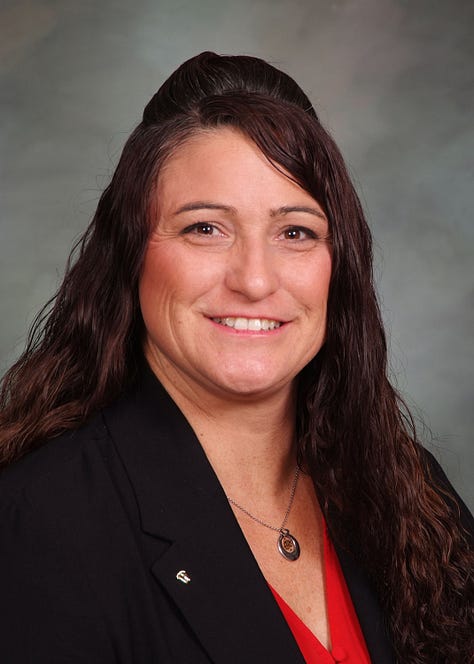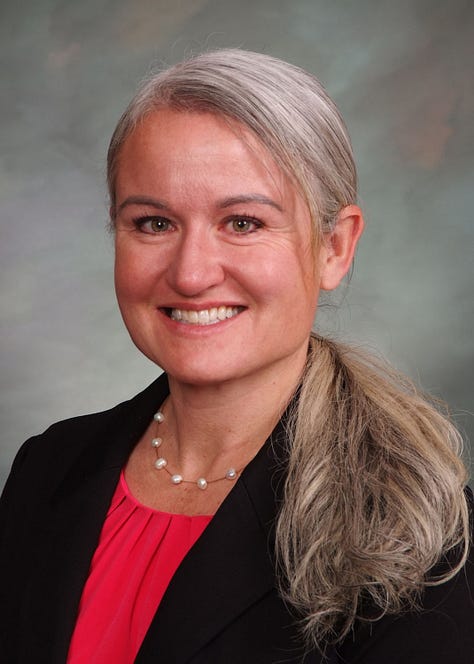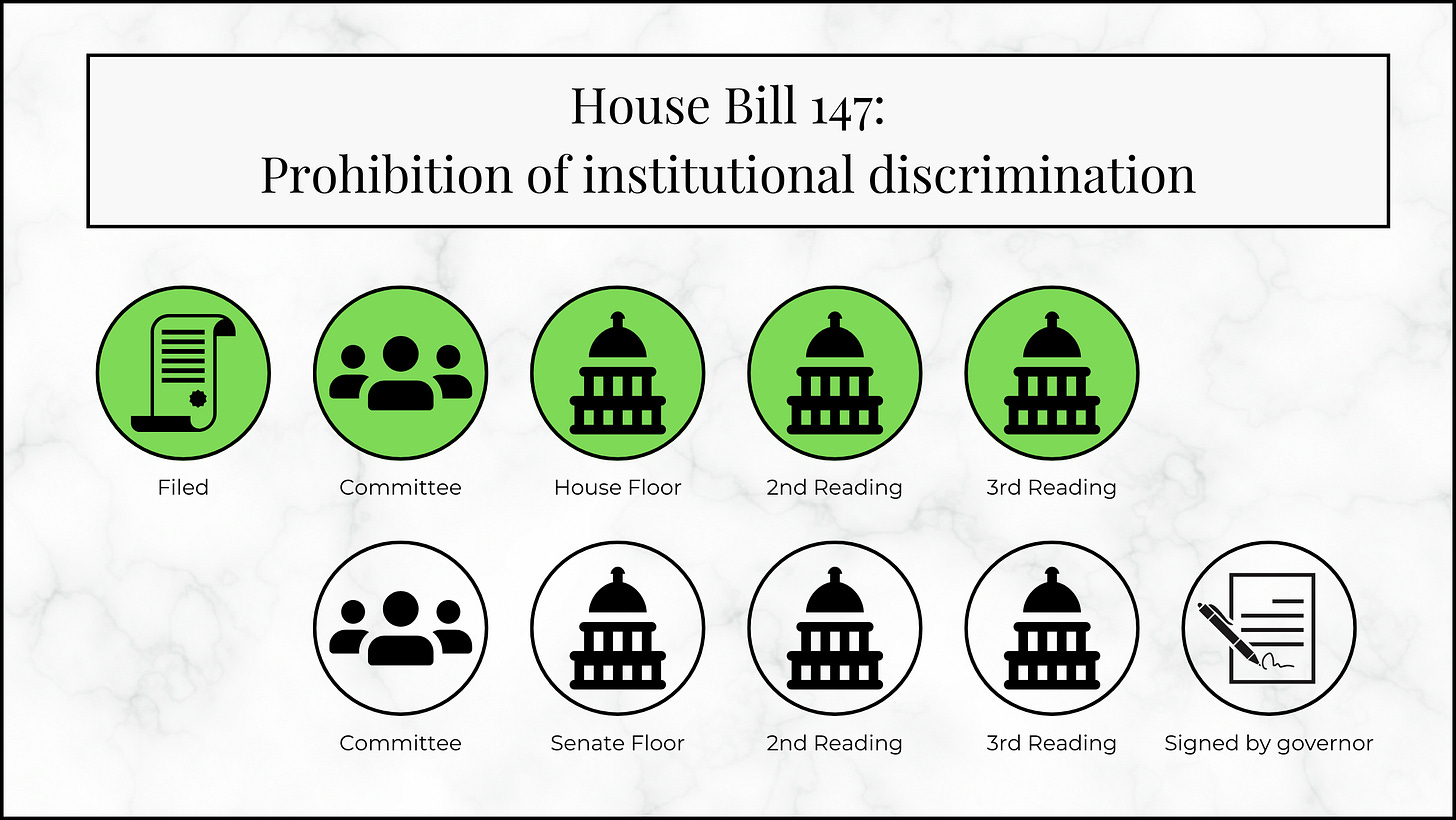Anti-trans, anti-DEI bills clear Wyoming House
An ascendent Freedom Caucus advanced the bills out of their original chamber within a week of the 2025 session’s first gavel. Laramie reps pushed back on both.
The swift passage of two right-wing policies in the Wyoming House is a testament to the power enjoyed by that chamber’s new rulers.
The Freedom Caucus, which gained a majority in the House during the last election, promised sweeping changes to state law. Now in office, its members are delivering on that promise, teeing up the Senate — possibly more moderate but now also brimming with Freedom Caucus allies — to endorse their work.
The House passed two bills Monday — one a legal declaration that sex and gender are identical and immutable, the other a crackdown on instructional material at the University of Wyoming — both with overwhelming support from the chamber.
A flood of other anti-trans bills — and at least one other bill targeting university curricula — are waiting in the wings, either working their way through the legislative process or else awaiting introduction in their chamber of origin.
The What is a Woman Act
The What is a Woman Act would enable the state and its agencies or subdivisions, like cities and counties, to “recognize or enforce distinctions between the sexes” when it comes to sports, prisons, crisis centers, locker rooms and restrooms.
The act is sponsored by Casper Rep. Jayme Lien (HD-38) and cleared the House Labor Committee last week, on the second day of the session, with a 7-1 vote.
Lien said her bill does not target the queer community, but the commenters who followed her spoke of the “transgender agenda” while others — including a former lawmaker who tried the same bill last year — spoke of the devil.
Those who testified against the bill — including two transgender individuals — said the legislation would make their lives more difficult.
Santi Murillo is the communications coordinator for Wyoming Equality, the state’s main LGBTQ+ advocacy organization. As a transgender woman, she said she had been using female restrooms in Wyoming for years without challenge or controversy.
“If I may ask the men on committee and the men in this room: would you feel comfortable with me in a restroom?” Murillo asked. “If we’re going based on biological sex — which I’ll never deny, I’m a trans woman — would you be comfortable with me in a restroom? For the past four years, I have been in this beautiful building with you all, using the women’s restroom, no problem, with no issue whatsoever.”
She said she would look out of place in the men’s restroom and would, statistically, be more likely to experience violence directed against her.
After clearing the committee, the bill sailed through its three required readings on the House floor.
Albany County Rep. Trey Sherwood (HD-14) introduced an amendment to delete the enacting clause of the legislation. If approved, the amendment would have killed the legislation. But such an amendment is not meant to be taken seriously.
The goal, as Sherwood put it, was to “just pause, catch our breath, see where we’re at, see how we’re feeling on something, and have one last conversation.”
Saying she could see where the vote was headed, Sherwood urged caution. The bill would redefine terms found throughout state statute and could have unintended consequences — perhaps hundreds of unintended consequences, by Sherwood’s count.
“If we adopt this bill with the current definition, we see little hiccups happening through our statutes,” she said.
Among those “hiccups,” according to Sherwood, the legislation could prohibit gender-nonconforming individuals from holding office — such as precinct committeeman or precinct committeewoman — and could threaten female National Guard members’ right to equal pay. Where these “unintended consequences” might conflict with other laws, litigation could ensue.
Sherwood’s amendment and remarks were not meant to inspire debate in the moment about these specifics, but rather to slow the swift advance of a bill she has steadfastly opposed.
The House voted 50-9 to pass the legislation, with three members excused. Among the nine who voted against the bill were Sherwood and her fellow Albany County Reps. Karlee Provenza (HD-45) and Ken Chestek (HD-13).
Albany County Rep. Ocean Andrew (HD-46) voted in favor.
Misadventures in defining womanhood
The “What is a Woman” Act draws its name from a 2022 documentary by DailyWire pundit Matt Walsh. The film’s central gimmick involves Walsh asking college professors and leftists to define womanhood, then mocking those interviewees for, in the documentarian’s estimation, failing to answer the trivially easy question, “What is a woman?”
But the difficulty of defining the word “female” has caused disagreements in Wyoming — even between lawmakers generally supportive of the What is a Woman Act.
In the proposal’s original language, “female” meant “a person whose biological reproductive system is developed to produce ova and/or who exhibits XX chromosomes and does not exhibit a Y chromosome.”
Lien proposed an amendment to her own bill when it appeared before the labor committee. That amendment, which was approved by the committee without debate, replaced the original definitions for “female” and “male” with those found in other anti-transgender legislation being tried this session.
The new definition declared that “female” describes “a person who has, had, will have or would have had, but for a congenital anomaly or intentional or unintentional disruption, the reproductive system that at some point produces, transports and utilizes eggs for fertilization” — and defined “male” almost verbatim with “sperm” replacing “eggs.”
This was the definition in the bill when the labor committee sent it to the House floor.



On the bill’s second reading, however, Casper Rep. Julie Jarvis (HD-57) introduced a further amendment, aiming to rewrite the definition of “female” once again. Jarvis’ amendment asserts that “female” denotes any “person whose birth certificate identifies the person as female.” (Jarvis argued determining someone’s sex by their birth certificate would be less invasive than examining their reproductive system; she would ultimately vote against the overall bill.) Jarvis’ amendment failed, but it wouldn’t be the last to enter the definitional fray.
On the bill’s third reading, Cheyenne Rep. Daniel Singh (HD-61) introduced an amendment to add “and/or who exhibits XX chromosomes” back into the definition of “female.”
He said he shared the privacy concerns that had motivated Jarvis’ earlier failed amendment. Singh said swabbing someone’s cheek to conduct a DNA test and determine their chromosomes would be less invasive than examining someone’s “reproductive system.”
“The language that we have now in the bill, it defines a man or a woman based on the development of the reproductive organs, but those reproductive organs are predicated upon the presence of these chromosomes,” Singh said. “I don’t believe that the intention of the bill is to define men and women based off of their reproductive organs, because there are other physiological features that are also affected and demonstrated by these chromosomes — be it the way that our voice boxes develop, or the distribution of fat tissues, or the development of the brain — all of those things are influenced by XX and XY chromosomes.”
Lien countered that the aim of her own definition was to match language being applied federally. The chamber voted and the amendment failed.
As it heads to the senate, the bill defines a “female” by reference to the reproductive system such a person has, could have or might have had.
Walsh’s film, for the record, lands on “adult human female” as a final definition for what a woman is. He rejects, mocks or edits over with music any answer resembling the equally simple assertion that “a woman is who she says she is.”
Banning DEI and lessons about “institutional discrimination”
House Bill 147 would prohibit government agencies — including the University of Wyoming, community colleges and public schools — from “engaging in” any program, or requiring any training, or promoting any policy that meets the bill’s own definition of “diversity, equity and inclusion.”
According to the bill, DEI is anything that “promotes differential or preferential treatment of individuals or classifies individuals on the basis of race, color, religion, sex, ethnicity or national origin.”
HB147 also forbids UW and other schools from requiring instruction about “institutional discrimination.”
“This bill restores our state government to the colorblind approach that the constitution intends, that morality dictates, and that our national unity requires,” Cody Rep. Rachel Rodriguez-Williams (HD-50) told her fellow lawmakers during a House Education Committee hearing last week.
Rodriguez-Williams is both chair of the Freedom Caucus and the bill’s main sponsor.
Education officials and others said HB147 would have a “chilling effect” on classrooms by failing to clearly state what it was prohibiting and leaving teachers afraid to discuss certain topics.
Meanwhile, representatives of groups such as the Family Policy Alliance and Moms for Liberty spoke in glowing terms about the bill, calling DEI “racist” and decrying a modern educational environment they said had gone off the rails.
Patricia McCoy of Moms for Liberty said teachers should offer instruction in a neutral way — even if the topic is about historical atrocities.
“You can teach the history of slavery without saying it was the result of white supremacy,” she said. “It was not just the result of white supremacy, and I can spend hours speaking about it, but you can do it without making people the aggressor or the oppressor in certain situations, and have those conversations without pushing certain ideologies.”
The committee advanced the bill with a unanimous 9-0 vote.
On the House floor, the vote was not unanimous but it was overwhelmingly in favor. The state’s lower chamber passed the bill with a 51-8 vote with three members excused.
Laramie rep attempts amendment to protect police
Rep. Provenza proposed an amendment exempting police and correctional officers from the DEI training prohibitions. She said the idea for the amendment stemmed from her own discussions with law enforcement.
“Some of the concern … has been that they have a lot of training that asks them to have conversations about cultural differences, maybe differences based on sex and different parts of the reasoning process,” she said, adding this is the training they fall back on to avoid escalating situations and to defend themselves if someone were to bring a federal civil rights lawsuit against them.

Rodriguez-Williams objected to the idea that her bill would cause problems for law enforcement, saying the bill “doesn’t come down to cultural competencies or prohibiting any sort of education.”
“This bill, the core of it, really is to mandate a colorblind approach for all government entities,” she said. “We need to go back to where we were before this DEI infiltration into our government entities. We need to look at competency, qualification, merit, education and experience of people. We don’t need to judge people based on their color or based on their sex.”
Provenza reiterated that her amendment spoke to real concerns and was not seeking to preserve “wokeness” within law enforcement.
She said officers go into “just a ton of different scenarios” and it’s not fair “to tie their hands and say that you have to give the exact same treatment, and we can’t give you any training on how to handle people differently.”
“I think it’s pretty clear that law enforcement isn’t trying to DEI- or woke-ify law enforcement — they’re trying to make sure that they are not barred from being able to do their jobs,” she said. “All I’m asking for is to make sure that we have an exemption for law enforcement so they can protect themselves, so they don’t increase danger to themselves, and so that they can fight back in litigation when they have done the correct thing.”
Like the bill itself, the House rejected Provenza’s amendment.
Both of the bills passed Monday will have to clear introduction in the Senate, appear before another committee in that chamber, and return to the Senate floor for three votes. If they clear the Senate, the bills will be sent to the governor’s desk for his signature or veto.








Headline could be 'Fragile masculinity bills clear Wyoming house.'
Thanks for the detailed reporting.